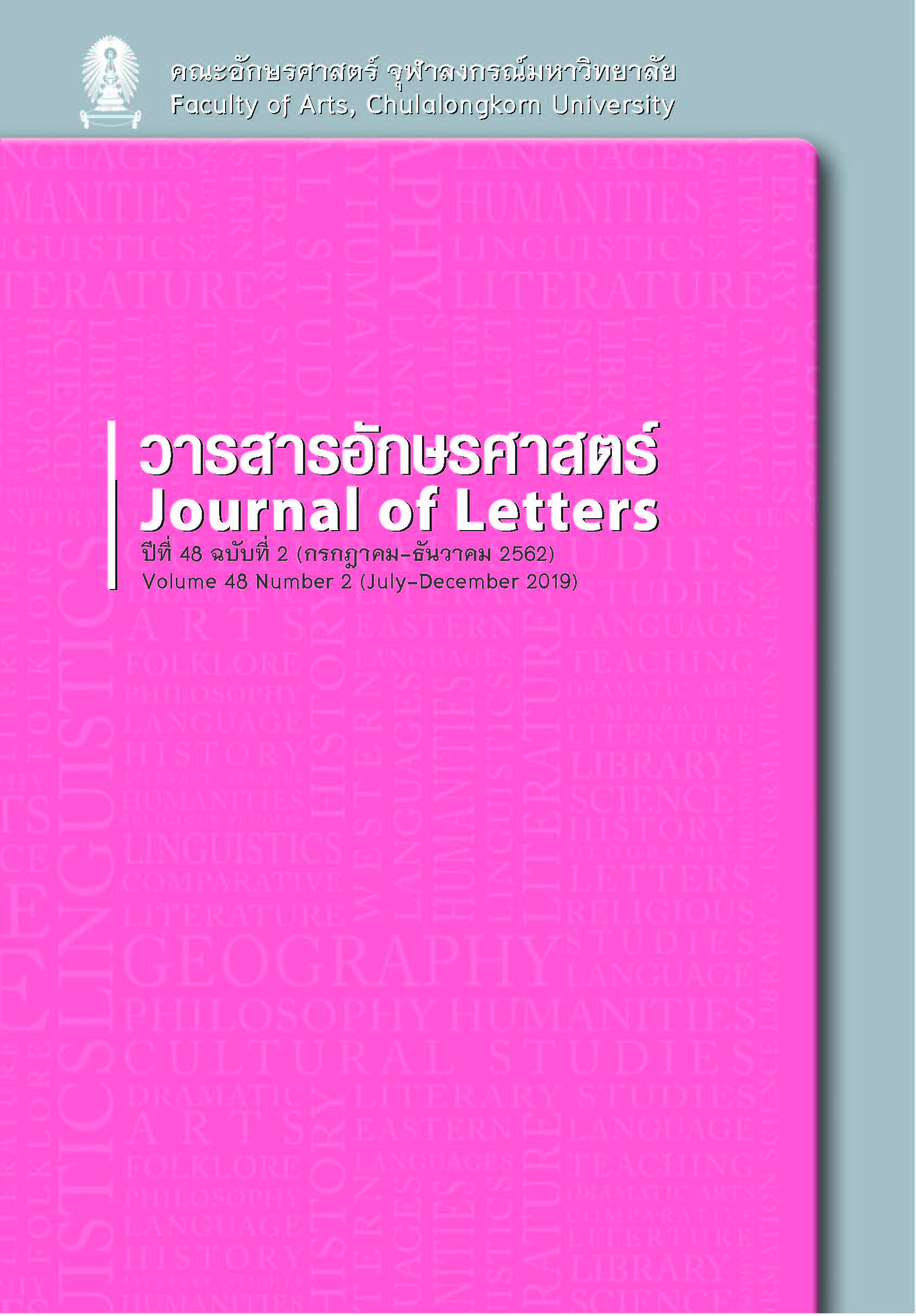Attitudes towards Thai Regional Dialects among Students Who Have Studied Linguistics and Those Who Have Not Studied Linguistics
Keywords:
Attitude, Thai Dialects, Linguistics, Objectiveness, Matched-guise TechniqueAbstract
The question examined in this research is whether knowledge of linguistics can make students more objective in their attitudes towards speakers of regional dialects. Data was collected from 236 undergraduate students who had completed two courses in linguistics and 192 who had never studied the subject. In this research the matched-guise technique was utilized. Respondents evaluated guise speakers on five characteristics: friendliness, intelligence, morality, physical attraction and wealth, using a 5-point scale. Although both groups of students made more positive assessments of speakers who used standard Thai, those who had studied linguistics reacted significantly less negatively to regional dialect users, i.e., Thai Southern and Northeastern dialect speakers, especially in terms of friendliness, morality, and physical attraction.
References
Jaralvilai Charunrochana, M.L. จรัลวิไล จรูญโรจน์, ม.ล. 2013. Thatsana Khati khong Nisit Radap Udumseuksa to Kan Chai Phasa khong Achan ทัศนคติของนิสิตระดับอุดมศึกษาต่อการใช้ภาษาของอาจารย์ [Attitude of University Students toward Language Use of Lecturers]. Warasan Manutsayasat วารสารมนุษยศาสตร์ [Humanities Journal] 20: 167-188.
Jaralvilai Charunrochana, M.L., & Yang, L. จรัลวิไล จรูญโรจน์, ม.ล., และ Yang, Lizhou. 2017. Thatsana Khati to Khon Thai lae Khon Chin khong Chao Chin thi Rian Phasa Thai lae Chao Thai thi Rian Phasa Chin: Kan Sueksa duai Konlavithi Phrang Siang Khu ทัศนคติต่อคนไทยและคนจีนของชาวจีนที่เรียนภาษาไทยและชาวไทยที่เรียนภาษาจีน: การศึกษาด้วยกลวิธีพรางเสียงคู่ [Attitude of Thais studying Chinese and Chinese Studying Thai toward Thai and Chinese Speakers: Matched-Guise Technique]. Warasan Manutsayasat Chabap Bandit Sueksa Mahawitthayalai Ramkhamhaeng วารสารมนุษยศาสตร์ ฉบับบัณฑิตศึกษา มหาวิทยาลัยรามคําแหง [Journal of Humanities Graduate School Edition Ramkhamhaeng University] 4(2): 16-35.
National Statistical Office สํานักงานสถิติแห่งชาติ. 2011. Sammano Prachakon lae Kheha Pho So Song Phan Ha Roi Ha Sip Sam สํามะโนประชากรและเคหะ พ.ศ. 2553 [The 2010 Population and Housing Census]. https://popcensus.nso.go.th/file/popcensus-08-08-55-T.pdf, accessed October 14, 2015.
National Statistical Office สํานักงานสถิติแห่งชาติ. 2012. Kan Samruat Phawa Setthakit lae Sangkhom khong Khrua Ruean Pho So Song Phan Ha Roi Ha Sip Si Thua Ratcha-anachak การสำรวจภาวะเศรษฐกิจและสังคมของครัวเรือน พ.ศ. 2554 ทั่วราชอาณาจักร [The 2011 Household Socio-Economic Survey Whole Kingdom]. https://service.nso.go.th/nso/nsopublish/themes/files/hhsocio_eco_wk.pdf, accessed October 14, 2015.
Somprach Wuttichan, Wilaiwan Khanittanan, & Kowit Pimpuang สมปราชญ์ วุฒิจันทร์, วิไลวรรณ ขนิษฐานันท์, และโกวิทย์ พิมพวง. 2017. Kan Chai Phasa Thai Thin Tai khong Nakrian nai Phak Tai การใช้ภาษาไทยถิ่นใต้ของนักเรียนในภาคใต้ [Southern Students' Use of Local Dialects Thai]. Warasan Mo Cho Ro Sangkhomsat Parithat วารสาร มจร สังคมศาสตร์ปริทรรศน์ [Journal of MCU Social Science] 5(2): 71-83.
The National Institute of Educational Testing Service สถาบันทดสอบทางการศึกษาแห่งชาติ. 2018. Sarup Phon Kan Thotsop thang Kan Sueksa Radap Chat Khan Phuenthan (O-NET) Chan Matthayom Sueksa Pi thi Hok Pi Kan Sueksa Song Phan Ha Roi Hok Sip สรุปผลการทดสอบทางการศึกษาระดับชาติขั้นพื้นฐาน (O-NET) ชั้นมัธยมศึกษาปีที่ 6 ปีการศึกษา 2560 [The Announcement of O-NET of Grade 12 Students, Academic Year 2017]. https://www.newonetresult.niets.or.th/AnnouncementWeb/PDF/SummaryONETM6_2560.pdf, accessed October 14, 2018.
Tomioka, Yutaka โทมิโอกะ, ยูทากะ. 2009. “Thatsanakhati to Phasa lae Kan Lueak Phasa khong Khon Thai Isan thi Mi Ayu Tang Kan” ทัศนคติต่อภาษาและการเลือกภาษาของคนไทยอีสานที่มีอายุต่างกัน [Language Attitudes and Language Choice of Northeastern Thai People of Different Ages]. Master thesis, Chulalongkorn University, Bangkok.
Foreign Language
Allport, G. 1954. The History Background of Modern Social Psychology. In Handbook of Social Psychology (Vol. 1), ed. Gardner Lindzey, 3-56. Cambridge, MA: Addison-Wesley.
Chanyam, Niramol. 2002. “A Study of Language Attitude toward Thai Dialects and their Speakers: A Case Study of Four Campuses of Rajamangala Institute of Technology.” Master thesis, Mahidol University, Nakhonpathom.
Cook, S. W., & Selltiz, C. 1964. A multiple-indicator approach to attitude measurement. Psychological Bulletin 62(1): 36-55. https://dx.doi.org/10.1037/h0040289
Garrett, Peter. 2010. Attitudes to Language: Key Topics in Sociolinguistics. [Kindle version]. https://www.amazon.com.
Genesee, F., & Holobrow, N. 1989. Change and Stability in Intergroup Perceptions. Journal of Language and Social Psychology 8(1): 17-38.
Lambert, W., Hodgson, R. Gardner, R., & Fillenbaum, S. 1960. Evaluational Reactions to Spoken Languages. Journal of Abnormal and Social Psychology 60: 44-51.
MacKinnon, Kenneth. 1981. Scottish Opinion on Gaelic: a Report on a National Attitude Survey for An Comunn Gàidhealach undertaken in 1981. Hatfield: School of Business and Social Sciences, Hatfield Polytechnic.
Palikupt, Deeyoo. 1983. “Central Thai and Northeastern Thai: A Linguistics and Attitudinal Study.” Doctoral Dissertation, University of Texas at Austin, Texas.
Sapir, Edward. 1921. Language: An Introduction to the Study of Speech. New York: Harcourt, Brace and Company.
Sinha, M. P. 2011. Modern Linguistics. New Delhi: Atlantic Publisher & Distributors.
Downloads
Published
How to Cite
Issue
Section
License
Copyright and plagiarism
Authors are responsible for obtaining permission to use copyrighted materials from copyright owners. Authors are responsible for observing requisite copyright law when quoting or reproducing copyrighted materials. Quotations and reproductions of content from other published sources must be accompanied by a reference and all sources should be clearly listed in the references section. Quotations and reproductions of content from external sources without due attribution could be considered a severe infringement of academic conduct and may constitute a legal offence under the Copyright Act of B.E. 2537. Any legal ramifications arising from the infringement of copyright regulations would be the sole responsibility of the author(s).



